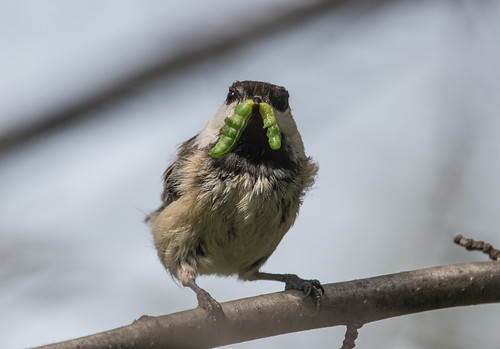I woke up this morning, as I usually do in June, listening to my neighborhood Red-eyed Vireo and robins singing away, and baby Song Sparrows chipping with hunger. Two or three different pairs of chickadees are nesting within a stone's throw of my yard, and cardinals are nesting on the next block, their songs conjuring up some of my finest childhood memories.
It’s fun to lie in bed a few minutes hearing the neighborhood gossip. The Song Sparrows fledged this weekend, and their parents are running themselves ragged keeping track of the chicks as they search for insects, especially caterpillars, to stuff into them. In June, robins are always somewhere in the nesting cycle—after one brood fledges, Dad shows them the ropes of life on Peabody Street while Mom incubates a new batch of eggs. Red-eyed Vireos are more mysterious, with Dad singing so persistently no matter where in the nesting cycle they are, and the fledglings hiding deep in foliage, so usually the best I can do is imagine what they’re up to.
This stuff happens every year, but as Rachel Carson wrote, “There is symbolic as well as actual beauty in the migration of the birds… There is something infinitely healing in these repeated refrains of nature, the assurance that night after night, dawn comes, and spring after winter.”
I was jolted out of this morning’s reverie about baby birds fulfilling the promise of bird migration in a most un-Rachel Carson way, by an airplane spewing pesticides right in my neighborhood in a ridiculously hopeless attempt to control a pest that is so pervasive right now that it would be impossible to eradicate, using a pesticide that targets caterpillars of every species.
Gypsy moth "control" is based on Bacillus thuringiensis, nicknamed Bt, a naturally occurring soil bacterium. A May 29 article in the Duluth News-Tribune summarized a Minnesota Department of Agriculture news release, reassuring readers that:
The treatment product is organic certified for food crops…. It has no known health effects for humans, pets, birds, fish, livestock, bees and other insects, but to avoid it residents may wish to stay indoors during the treatment and keep windows closed for a half hour after application. The residue does not cause damage to outdoor surfaces and can be removed with soapy water.(The article was updated Friday to announce today's spraying, with the same PR fluff about how harmless Bt is.)
One line is an outright lie. The statement that Bt has no known health effects for bees "and other insects" is absolutely false. Bt outright and indiscriminately kills all lepidopteran caterpillars, and caterpillars are, indeed, insects. For the Duluth News-Tribune to print such a clear falsehood without question, straight out of industry PR materials, can't even be called shoddy journalism—it's not journalism, period.
My poor backyard birds will have no clue why caterpillars are suddenly harder to come by. I’ve written and talked a lot over the years about how most of the insects that Whip-poor-wills, nighthawks, and songbirds depend on are declining. Meanwhile, gypsy moths are doing just peachy despite all the spraying. They pose a serious economic problem for which spraying has simply not helped—they’re cyclic and keep coming back even as the many, many harmless and helpful lepidopteron species, already in trouble, continue to dwindle.
Spraying Bt from airplanes may at least be better than spraying DDT from trucks, another vivid childhood memory. We were told that was harmless, too, yet my big brother, who chased the truck with the other little boys night after night, developed weird fatty subcutaneous lumps all over his body as a young man. Was it DDT or the Agent Orange he was exposed to in Vietnam that caused this and ultimately led to the cancer that killed him? We’ll never know.
That DDT spraying didn’t end mosquitos in my town or anywhere else, and this spraying won’t end gypsy moths in Duluth or anywhere else. We keep making the same mistakes, and the companies that manufacture and administer pesticides and write proposals to ag departments and release PR news statements, and the news media that repeat those PR claims verbatim without investigating, keep making the same profits. This time people may not pay—well, except for those of us who plant milkweed and love to watch our caterpillars grow—but the chickadees, Red-eyed Vireos, cardinals, robins, and Song Sparrows in my neighborhood will start struggling to find enough caterpillars to bring their young to independence. We people may gripe about being awakened by an airplane at 5:30, but most of us won’t even notice the lasting effects our birds will be dealing with.
I’m the age right now that my brother was when he died. Like the problems the older generation left us boomers with, we’ll be leaving our young people plenty of problems to deal with. Overblown assurances that “it’s organic!” and “it won’t hurt you—promise!” will keep Bt spraying for a long time to come, and the gypsy moths still won’t go away. A handful of people will keep profiting, a smaller handful will keep protesting about how it hurts beneficial insects and the birds that eat them and isn’t solving the gypsy moth problem at all, and most people will keep ignoring the situation. I guess I’m glad that I won’t be around to see what finally wakes people up this time.

